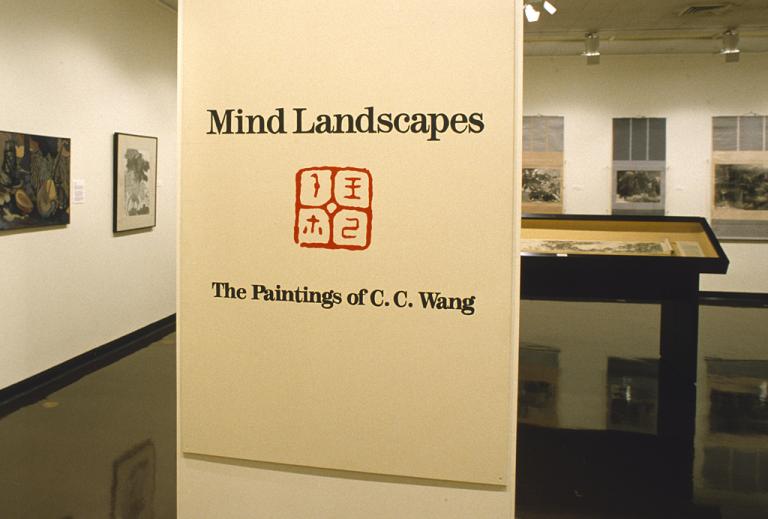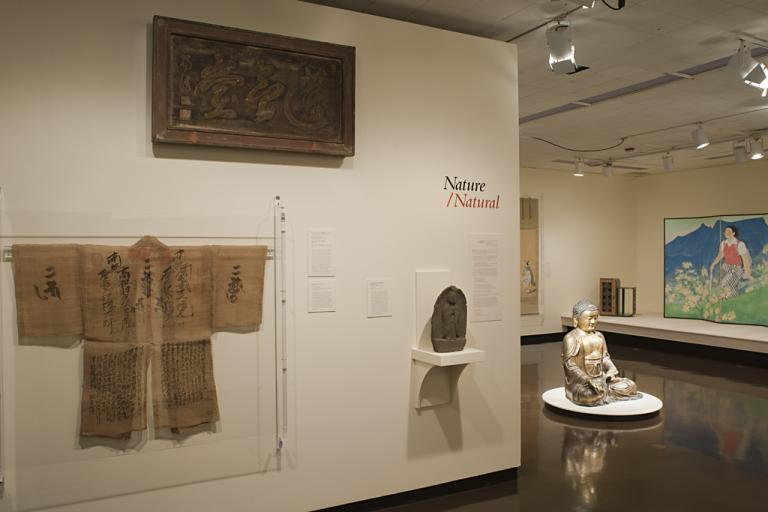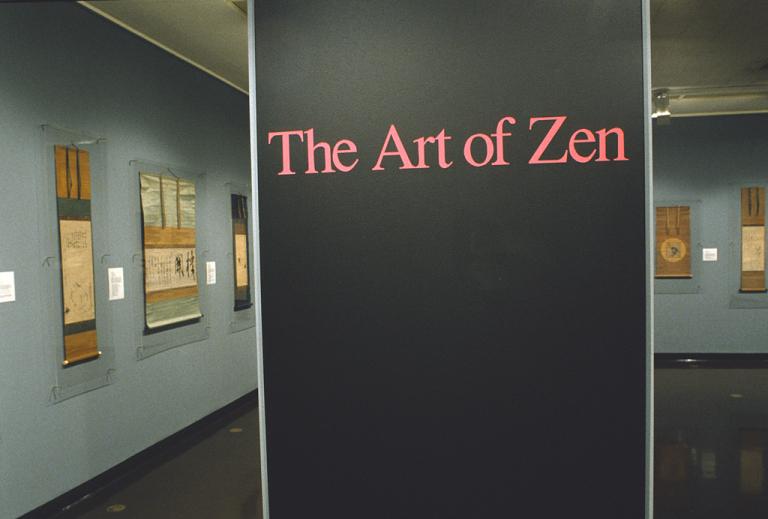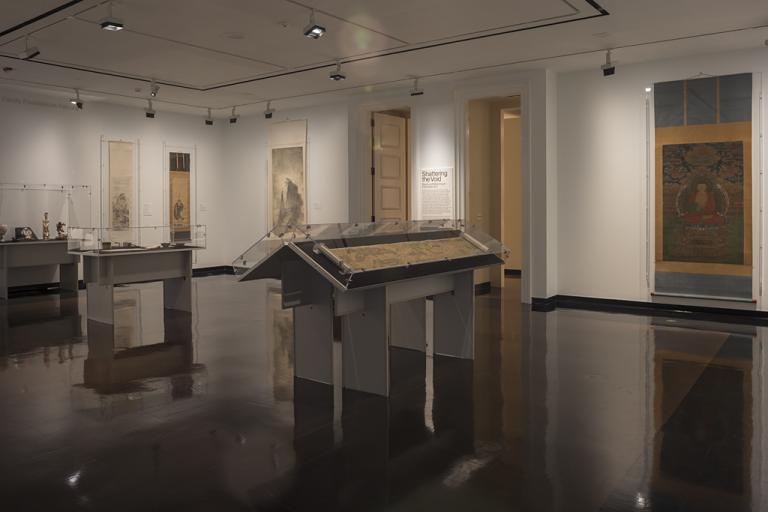Daruma crossing the river, Fūgai Ekun
Artwork Overview
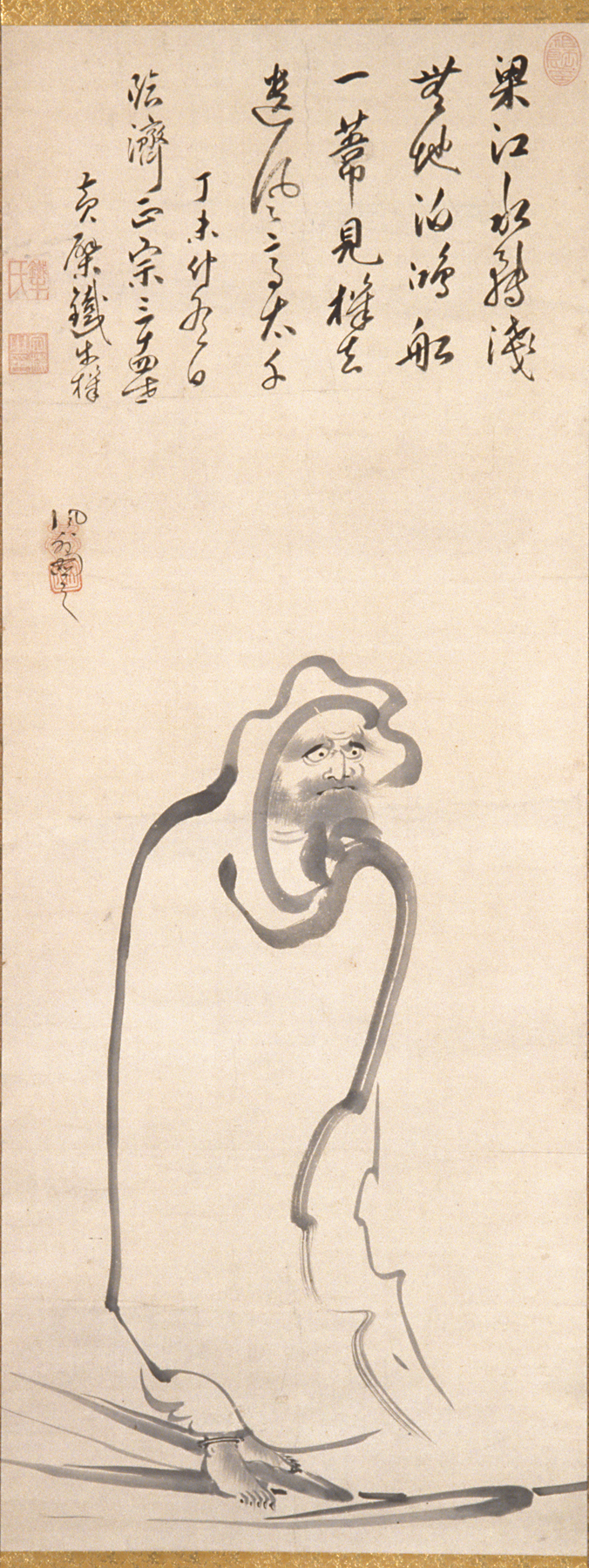
Image Dimensions Height/Width (Height x Width): 127.3 x 47.8 cm
Image Dimensions Height/Width (Height x Width): 50 1/8 x 18 13/16 in
Mount Dimensions (Height x Width x Depth): 208.3 cm
Mount Dimensions (Height x Width x Depth): 82 in
If you wish to reproduce this image, please submit an image request
Images
Label texts
Inscription by Tetsugyu (1628–1700):
The water in the Liang River becomes shallow,
There is no place to moor a large boat.
Watch him go by on a single reed—
His legacy continues to increase and increase.
Typically depicted with glaring eyes and his hands tucked into his robe, the image of the monk Daruma evokes serious Zen Buddhist practices as well as a sense of humor, inviting viewers to laugh at the unpredictability of this world. This painting recalls an episode from Daruma’s life when his dedication to spreading Buddhism propelled him across the Yangtze River in China on a thin reed. Like Daruma, artist Fūgai Ekun was a monk, but did not find satisfaction in temple life and became a hermit, living alone in caves in northern Japan and trading his paintings for food and supplies.
Inscription by Tetsugyu (1628–1700):
The water in the Liang River becomes shallow,
There is no place to moor a large boat.
Watch him go by on a single reed—
His legacy continues to increase and increase.
Typically depicted with glaring eyes and his hands tucked into his robe, the image of the monk Daruma evokes serious Zen Buddhist practices as well as a sense of humor, inviting viewers to laugh at the unpredictability of this world. This painting recalls an episode from Daruma’s life when his dedication to spreading Buddhism propelled him across the Yangtze River in China on a thin reed. Like Daruma, artist Fūgai Ekun was a monk, but did not find satisfaction in temple life and became a hermit, living alone in caves in northern Japan and trading his paintings for food and supplies.
Inscription by Tetsugyu (1628–1700):
The water in the Liang River becomes shallow,
There is no place to moor a large boat.
Watch him go by on a single reed—
His legacy continues to increase and increase.
Typically depicted with glaring eyes and his hands tucked into his robe, the image of the monk Daruma evokes serious Zen Buddhist practices as well as a sense of humor, inviting viewers to laugh at the unpredictability of this world. This painting recalls an episode from Daruma’s life when his dedication to spreading Buddhism propelled him across the Yangtze River in China on a thin reed. Like Daruma, the artist, Fūgai Ekun was a monk, but did not find satisfaction in temple life and became a hermit, living alone in caves in northern Japan and trading his paintings for food and supplies.
Inscription by Tetsugyu (1628–1700):
The water in the Liang River becomes shallow,
There is no place to moor a large boat.
Watch him go by on a single reed—
His legacy continues to increase and increase.
Typically depicted with glaring eyes and his hands tucked into his robe, the image of the monk Daruma evokes serious Zen Buddhist practices as well as a sense of humor, inviting viewers to laugh at the unpredictability of this world. This painting recalls an episode from Daruma’s life when his dedication to spreading Buddhism propelled him across the Yangtze River in China on a thin reed.
Like Daruma, the artist Fūgai Ekun was a monk, but did not find satisfaction in temple life and became a hermit, living alone in caves in northern Japan and trading his paintings for food and supplies.
Inscription by Tetsugyu (1628–1700):
The water in the Liang River becomes shallow,
There is no place to moor a large boat.
Watch him go by on a single reed—
His legacy continues to increase and increase.
Typically depicted with glaring eyes and his hands tucked into his robe, the image of the monk Daruma evokes serious Zen Buddhist practices as well as a sense of humor, inviting viewers to laugh at the unpredictability of this world. This painting recalls an episode from Daruma’s life when his dedication to spreading Buddhism propelled him across the Yangtze River in China on a thin reed. Like Daruma, the artist, Fūgai Ekun was a monk, but did not find satisfaction in temple life and became a hermit, living alone in caves in northern Japan and trading his paintings for food and supplies.
Inscription by Tetsugyu (1628–1700):
The water in the Liang River becomes shallow,
There is no place to moor a large boat.
Watch him go by on a single reed—
His legacy continues to increase and increase.
Daruma is the Japanese name for the legendary founder of Zen (Ch: Chan) Buddhism. He is believed to have been an Indian monk who traveled to China, bringing with him the special teachings of Zen. The artist, Fūgai, who was also a Zen monk, here illustrates one of the famous incidents in Daruma’s life. After leaving the court of the Buddhist emperor Wu of Liang in southern China, Daruma made his way north. When he came to the mighty Yang-tze River, he miraculously crossed it standing on a reed. Modern scholars have noted that the written character for ‘reed’ in Chinese once also meant “reed boat,” but over the centuries the more extraordinary interpretation became the popular one.
Fūgai did not find satisfaction in temple life and became a hermit, living in caves in northern Japan and trading his paintings for food and supplies. In some respects, his life paralleled tales told of Daruma, who is said to have meditated for nine years facing a cave wall. Fūgai’s paintings exhibit a deceptive simplicity, representing Zen ideals of immediacy and spontaneity through dynamic brushwork.
Inscription by Tetsugyu (1628-1700):
The water in the Liang River becomes shallow,
There is no place to moor a large boat.
Watch him go by on a single reed-
His legacy continues to increase and increase.
Daruma is the Japanese name for the legendary founder of Zen (Ch: Chan) Buddhism. He is believed to have been an Indian monk who traveled to China, bringing with him the special teachings of Zen. The artist, Fugai, who was also a Zen monk, here illustrates one of the famous incidents in Daruma’s life. After leaving the court of the Buddhist emperor Wu of Liang in southern China, Daruma made his way north. When he came to the mighty Yang-tze River, he miraculously crossed it standing on a reed. Modern scholars have noted that the written character for ‘reed’ in Chinese once also meant “reed boat,” but over the centuries the more extraordinary interpretation became the popular one.
Fugai did not find satisfaction in temple life and became a hermit, living in caves in northern Japan and trading his paintings for food and supplies. In some respects, his life paralleled tales told of Daruma, who is said to have meditated for nine years facing a cave wall. Fugai’s paintings exhibit a deceptive simplicity, representing Zen ideals of immediacy and spontaneity through dynamic brushwork.
Exhibition Label:
"Compassionate Beings: Japanese Buddhist Art," Sep-2009, Kris Ercums
Inscription by Tetsugyu (1628–1700):
The water in the Liang River becomes shallow,
There is no place to moor a large boat.
Watch him go by on a single reed—
His legacy continues to increase and increase.
Daruma is the Japanese name for the legendary founder of Zen (Ch: Chan) Buddhism. He is believed to have been an Indian monk who traveled to China, bringing with him the special teachings of Zen. The artist, Fūgai, who was also a Zen monk, here illustrates one of the famous incidents in Daruma’s life. After leaving the court of the Buddhist emperor Wu of Liang in southern China, Daruma made his way north. When he came to the mighty Yang-tze River, he miraculously crossed it standing on a reed. Modern scholars have noted that the written character for ‘reed’ in Chinese once also meant “reed boat,” but over the centuries the more extraordinary interpretation became the popular one.
Fūgai did not find satisfaction in temple life and became a hermit, living in caves in northern Japan and trading his paintings for food and supplies. In some respects, his life paralleled tales told of Daruma, who is said to have meditated for nine years facing a cave wall. Fūgai’s paintings exhibit a deceptive simplicity, representing Zen ideals of immediacy and spontaneity through dynamic brushwork.
Archive Label 2003:
Inscription by Tetsugyu (1628-1700):
The water in the Liang River becomes shallow,
There is no place to moor a large boat.
Watch him go by on a single reed-
His legacy continues to increase and increase.
(Trans. Stephen Addiss)
Daruma is the Japanese name for the legendary founder of Zen Buddhism in East Asia. He is believed to have been an Indian monk who traveled to China, bringing with him the special teachings of Zen. The artist, Fūgai, who was also a Zen monk, here illustrates one of the famous incidents in Daruma’s life. After leaving the court of the Buddhist emperor Wu of Liang in southern China, Daruma made his way north. When he came to the mighty Yangzi (Yang-tze) River, he miraculously crossed it standing on a reed. Modern scholars have noted that the written character for ‘reed’ in Chinese once also meant ‘reed boat,’ but over the centuries the more extraordinary interpretation became the popular one. Fūgai did not find satisfaction in temple life and became a hermit, living in caves in northern Japan and trading his paintings for food and supplies. In some respects, his life paralleled tales told of Daruma, who is said to have meditated for nine years facing a cave wall. Fūgai’s paintings exhibit a deceptive simplicity, representing Zen ideals of immediacy and spontaneity through dynamic brushwork.
Archive Label date unknown:
An Indian monk who is believed to have traveled to China, Daruma is the legendary founder of Zen. Here the Zen monk Fūgai illustrates one of the famous incidents in Daruma's life, after he left the imperial court of the southern Liang dynasty and crossed the Yangtze river. The written character that means "reed" in Chinese once also meant "reed boat," but it has long been accepted as miraculous that Daruma was able to cross the river standing on a reed. Fūgai did not find satisfaction in temple life, so retired to live in the caves of northern Japan. In some respects his life paralleled that of Daruma, who is said to have meditated for nine years facing a cave wall. Fūgai's simple paintings were brushed with great dynamism and spontaneity. His portrayals of Daruma contain an intense spiritual vision which Fūgai must have shared.
Archive Label date unknown:
Daruma (Skt: Bodhidharma; Ch: Damo), regarded as the first Chinese patriarch of Zen (Ch: Ch'an) Buddhism, traveled to China from India in the late fifth century. After failing to bring Emperor Wu of the Liang dynasty in southern China to enlightenment, Daruma made his way to the Shaolin Temple in northern China where he continued to practice meditation facing a cave wall. With time fabulous tales grew up around this legendary figure, and the more popular incidents became favorite subject matter for paintings. Here the Japanese Zen monk Fūgai has illustrated the account that Daruma crossed the Yangtze River on a reed on his northward journey.
Fūgai did not find satisfaction in temple life, so he retired to live in the caves of northern Japan. In some respects his life was parallel to that of Daruma, who is said to have meditated while facing a cave wall for nine years. Fūgai's simple paintings show great dynamism and spontaneity. His portrayals of Daruma express the intense spiritual vision of the patriarch, which Fūgai himself must have shared.
Exhibitions
Rachel Straughn-Navarro, curator
Rachel Straughn-Navarro, curator
Rachel Straughn-Navarro, curator
Emma Scioli, curator
Paul Stock, curator
Kate Meyer, curator

